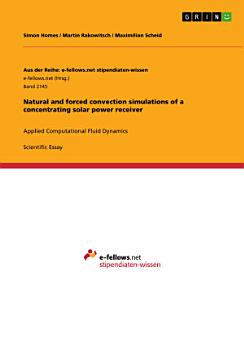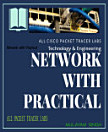Natural and forced convection simulations of a concentrating solar power receiver: Applied Computational Fluid Dynamics
Nov 2016 · Aus der Reihe: e-fellows.net stipendiaten-wissen Book 2145 · GRIN Verlag
Ebook
44
Pages
family_home
Eligible
info
reportRatings and reviews aren’t verified Learn More
About this ebook
Scientific Essay from the year 2016 in the subject Engineering - Mechanical Engineering, grade: A, KTH Royal Institute of Technology (School of Engineering Sciences), course: Applied Computational Fluid Dynamics, language: English, abstract: Concentrating Solar Power Receiver (CSPs) collect solar radiation with large mirrors and reflect them concentrated on a receiver. Here, a Dish-Stirling type thermal cycle is driven. One of the key preconditions for a cost competitive production of power is a good efficiency factor. Within the framework of this project, we want to examine and qualitatively quantify the heat losses of a Dish Sterling Concentrating Solar Power Receiver. It is the aim to determine the individual driving forces for heat losses by analysing natural convection on the one hand and two different setups of forced convection on the other hand. In section 2, we present the abstract model of a solar receiver. Then, we will discuss the necessary models to simulate turbulent flow and heat transfer of air and justify our choice of numerical methods to solve the governing equations in ANSYS Fluent. Furthermore, we will introduce performance factors to monitor the heat losses of the solar receiver. Coherent with the two main physical phenomena of heat losses, we subdivided the report in normal convection (NC, section 3) and forced convection (FC, section 4), where we outline the specific model characteristics, boundary conditions, grid requirements and benchmarks respectively. A profound analysis of the results and an outlook on further research in section 5 finalise the report.
Rate this ebook
Tell us what you think.
Reading information
Smartphones and tablets
Install the Google Play Books app for Android and iPad/iPhone. It syncs automatically with your account and allows you to read online or offline wherever you are.
Laptops and computers
You can listen to audiobooks purchased on Google Play using your computer's web browser.
eReaders and other devices
To read on e-ink devices like Kobo eReaders, you'll need to download a file and transfer it to your device. Follow the detailed Help Center instructions to transfer the files to supported eReaders.







